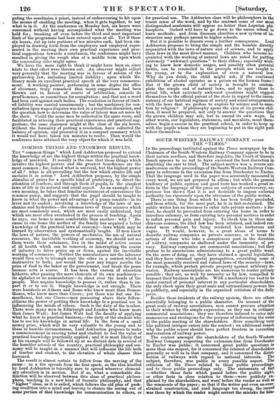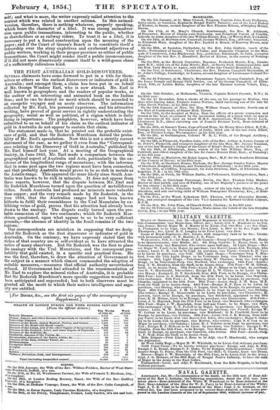SOUTH-WESTERN RAILWAY COMPANY versus THE "TIMES."
Ii' the proceedings instituted against the Times newspaper by the Chairman of the South-Western Railway Company appear to be in their nature needless, and therefore impolitic, the Court of Queen's Bench appears to us not to have exercised the best discretion in admitting the case to trial. The subject-matter was a severe ani- madversion on the proceedings of the South-Western Railway Com- pany in reference to the extension-line from Dorchester to Exeter. That the language used in the paper was accurately measured in every word, we are not prepared to affirm ; but while the general tendency of public opinion and good taste has worked a great re- form in the language of the press on subjects of controversy, ex- perience has shown that it is not desirable to impose external authority too rigorously upon the utterance of the public 'writer.
There is one thing prom which he has been totally precluded, and from which, for the most part, he is in fact restrained. The public writer has no business to enter into private matters ; a for- tiori, he should be prevented from entering the home in order to introduce calumny, or from entering into personal motives in order to inflict personal pain and injury. To check him in those mis- chievous courses the libel law has been retained, and indeed ren- dered more efficient by being rendered less barbarous and vague. It would, however, be a great abuse of terms to describe railway companies as private concerns, or to treat the actions of those who take a conspicuous part in the direction of railway companies as sheltered under the immunity of pri- vacy. Railway companies are commercial associations ; but they profess to be associations administering to a great public want. On the score of doing so, they have claimed a special legislation, and they have obtained special prerogatives, overriding some of the most generally received and valued laws of the country—laws, for example, which protect private property against arbitrary in- vasion. Railway associations are too numerous to render priva4y possible ; they are, as well by necessity as by law, compelled to transact their business in public. With a machinery too vast to be under control of personal interest in any particular shareholders, the only check upon their great scale and extraordinary powers lies in publicity, and especially in the organized criticism of the daily press.
Besides these incidents of the railway system, there are others essentially belonging to a public character. On account of the great scale of railway associations, men cannot procure attention to their wishes by the simple expression, as they can in ordinary commercial associations; they are therefore induced to enter into manceuvres and stratagems for the purpose of influencing the votes at the public meeting of the shareholders. Here something very like political intrigue enters into the contest ; an additional reason -why the public censor should have perfect freedom in correcting malversation of railway power.
The contest amongst the shareholders of the South-Western Railway Company respecting the extension-line from Dorchester to Exeter was public; it concerned great public questions in more than one respect, for it concerned the interest of shareholders generally as well as in that company, and it concerned the distri- bution of railways with regard to national interests. The subject, therefore, was public in every possible aspect. The criticism of the Times related to those public proceedings, and to those public proceedings only. The statements of fact —whether those fade which passed before the public sight, or other facts in close relation to them—were publicly ex- plained by the shareholders, and were before the reader as well 110 the comments of the paper ; so that if the writer put even an over- strained construction and used language too strong, the record was there by whirl the reader might correct the mistake for him- self; and what is more, the writer expressly called attention to the oontest which was related in another column. In this animad- version, therefore, there is nothing whatever, properly speaking, which bears the character of a libel. It was strong animadver- sion upon public transactions, interesting to the public, whether as shareholders or as railway riders. To treat it as a libel, it is necessary to put a forced construction upon the meaning of the paper; and if the Court of Queen's Bench is to constitute itself a censorship over the stray expletives and exuberant adjectives of public writers, working in their proper province as critics of public transactions, the Court might render itself a public inconvenience, if it did not more disastrously commit itself to a wild-goose chase of a sufficiently ridiculous kind.



































 Previous page
Previous page